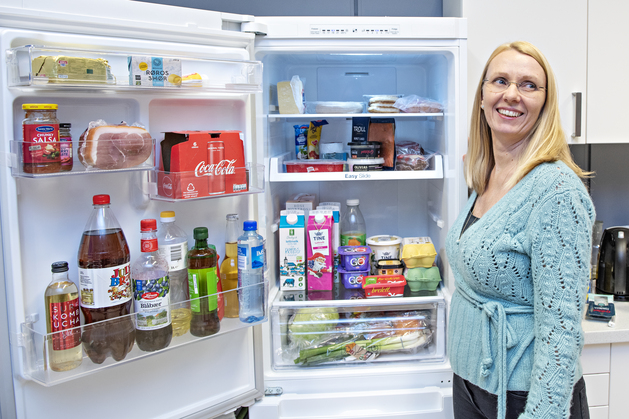Pregnant and ready for a trip abroad? Learn what is safe to eat when visiting a foreign country

Make sure you know which food is safe to eat on vacation. These are a food scientist’s top tips when it comes to a safe holiday diet.
Imagine standing in front of a delicious Greek breakfast buffet. You have made it through a long flight and are now ready to enjoy your holiday. But what is actually safe to eat in this buffet? Your holiday feeling can quickly be ruined by worries and stress related to unsafe food.
For pregnant women, there are plenty of warnings. You should be careful when it comes to alcohol, smoking, medications, coffee and several types of food. Maybe you are afraid of eating something that could harm your unborn baby, and maybe you limit yourself more than necessary.
In various online forums, pregnant women are warned from eating dairy products, meat, and vegetables. The last thing pregnant women want is to harm their unborn babies. However, eating dry bread all holiday for fear of doing something wrong is boring. To make things easier for pregnant women, we spoke to bacterial expert and food scientist Solveig Langsrud.
“There are some foods you should be careful about when pregnant, but there is still a lot of tasty stuff you can eat. Canned food isn’t the only thing that is safe”, says Langsrud.
All inclusive
If you are going to eat from the hotel buffet or stay on an all-inclusive basis, Solveig Langsrud classifies these types of food as safe:
- Freshly cooked hot food that has been thoroughly cooked/boiled
- Bakery products such as bread, rolls and cakes
- Hard cheeses made from pasteurized milk, and tube cheese
- Dairy products (milk, yogurt) made from pasteurized milk
- Raw fruits and vegetables that have been peeled (but avoid pre-cut fruit that has been left out in the heat). An apple that has been rinsed well is also considered safe.
- Sweets and snacks
- All canned/jarred food, such as jam
- Bottled water, fizzy drinks and non-alcoholic beer and cider, freshly made tea or coffee
Through several research projects and the Nofima-led EU project called SafeConsume, Langsrud and her colleagues have developed advice that makes cooking in the kitchen safer:
“Our research showed that most people in Norway have very good kitchen hygiene. However, it can become a problem if you don’t have the tools and utensils in your holiday apartment that you are used to having in order to store and cook food in a safe way”, Langsrud points out.
If you rent a holiday apartment and have access to a kitchen, there are several measures you can take to reduce the likelihood of getting sick from the food you eat. For example, you can pack some utensils to help keep the unfavourable bacteria away from food:
1. Refrigerator thermometer. Check that the temperature in the refrigerator is below 4 degrees. Listeria grows faster at higher temperatures, and at 8 degrees, you achieve about half the shelf life compared to 4 degrees.
2. Food thermometer. Raw meat may contain Toxoplasma and harmful bacteria. Make sure meat is cooked on all sides and that the core temperature reaches at least 70 degrees. Take extra care to cook eggs thoroughly if you are making scrambled eggs. Eggs can be a source of Salmonella, and pregnant women who are taking antacid medication are very susceptible to unfavourable bacteria in food.
3. Dishwashing brush. Dishwashing brushes are more hygienic than sponges. Salmonella can survive in kitchen sponges. A kitchen sponge can contain as many bacteria as there are humans on Earth!
4. Plastic chopping board. Bring a separate chopping board for bread, vegetables and fruit that are going to be eaten raw. Plastic is easier to keep clean compared to wood.
In addition, remember to thoroughly rinse vegetables and fruits, even those with skins.
Where you travel matters
Where you travel matters
Food safety in other countries is not always as good as in Norway, both because of warmer climates and poorer hygiene. There is a connection between the economy and safe food production. In countries with poorer economies, extra care should be taken to follow the authorities’ health advice.
Facts about dangerous bacteria
There are two groups of bacteria that are particularly dangerous for unborn babies and that you want to avoid: Listeria and Toxoplasma. Both Listeria and Toxoplasma die when exposed to heat treatment, and are therefore not a problem for foods that are boiled or fried right before you eat them.
Listeria
A bacterium that occurs in cold-stored foods with a long shelf life. Pregnant women in Norway are advised to avoid a variety of ready-to-eat foods such as soft and semi-soft cheeses, raw fish products with a long shelf life such as fermented trout and char (rakfisk) and smoked salmon, cold cuts of meat that do not contain preservatives and salad chicken. The same rules apply abroad.
Toxoplasma
This bacterium can be found in meat, and pregnant women in Norway are advised to avoid eating meat that is raw or not fully cooked. Raw meat also includes cured meats. When abroad, one must also be careful with raw fruits and vegetables, especially those growing on the ground, such as lettuce. A common rule is to stick to fruits and vegetables that can be peeled, but it is perfectly fine to eat an apple that you have rinsed well with water.
Advice from the authorities
- Pregnant women | Advice for special groups | matportalen.no – Information from public authorities about healthy and safe food
- Food when travelling abroad | Sick from food | Food contamination and hygiene | matportalen.no – Information from public authorities about healthy and safe food
- Food and drink that pregnant women should be careful with – Helsenorge Acute Toxoplasma infection in pregnant women worldwide: A systematic review and meta-analysis – PMC (nih.gov)
- Listeria and Toxoplasma may harm the fetus | Pregnant women | Advice for special groups | matportalen.no – Information from public authorities about healthy and safe food
Contact person
Research areas
